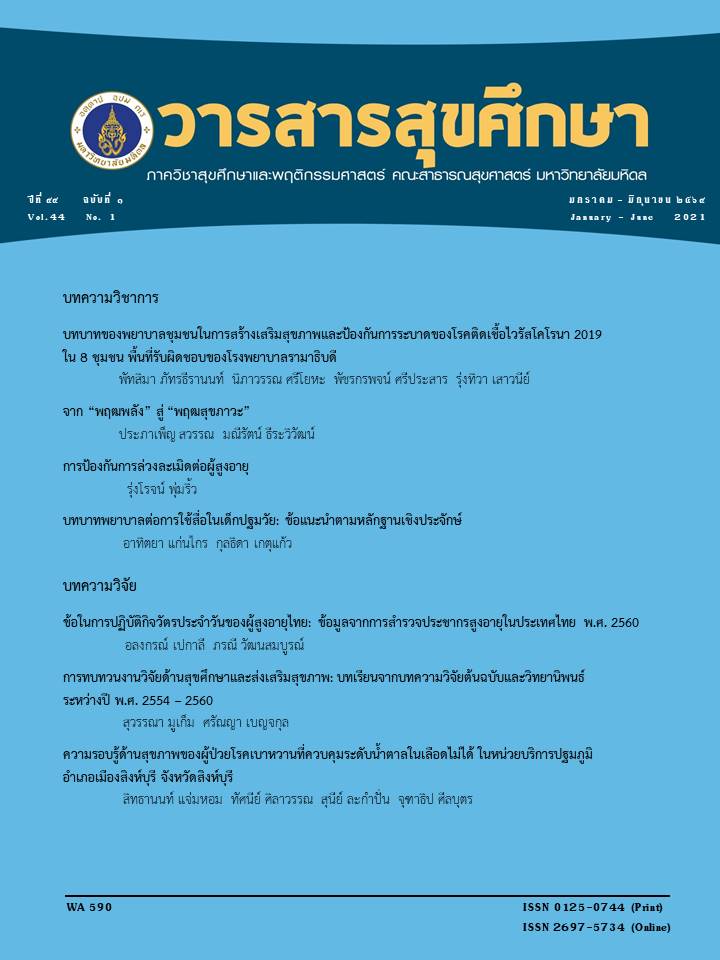Family Functioning and Strength of Family with Elderly in Phrae Province
Keywords:
factors significantly influencing, strength of family with elderly, family functioningAbstract
This cross-sectional survey research has the objective to study family functioning and the factors influencing the strength of family with elderly in Phrae province. Study samples were 310 heads of family with an elderly aged 60 years and over, recruited through a multi-stage sampling. Data were collected through a questionnaire from 23 January to 21 February 2019, and analyzed by frequency, percentage, mean, standard deviation, Chi-square test, and logistic regression analysis. The results showed that most of the families (60.3%) had the strength that passed the criteria and 39.7% failed the criteria. The factors significantly influencing the strength of family with elderly (p<0.05) included family stress, the number of dependent elderly, family functioning in the dimension of effective involvement, and the number of family members with employment. The families with no presence of stress had a 4.7 times greater chance to have adequate family strength to pass the criteria compared to families with a presence of stress. The families without dependent elderly had a 3.8 times greater chance to have adequate family strength to pass the criteria compared to families with dependent elderly. Families with good family functioning in the dimension of effective involvement had a 2.4 times greater chance to have adequate family strength to pass the criteria compared to families with poor family functioning in the same dimension. Families with 3-4 employed family members had a 2 times greater chance to have adequate family strength to pass the criteria compared to families with 1-2 employed family members. The study suggests that the agencies concerned promote family strength by promoting good role functioning toward each other among family members, stress management techniques for family members, and the enhancement of knowledge and understanding about the care of dependent elderly, which would foster the strength of the family with elderly further.
References
สำนักงานกิจการสตรีและสถาบันครอบครัว กระทรวงการพัฒนาสังคมและความมั่นคง ของมนุษย์. นโยบายและยุทธศาสตร์การ พัฒนาสถาบันครอบครัว พ.ศ. 2560-2564. กรุงเทพมหานคร: องค์การสงเคราะห์ทหารผ่านศึกษา ในพระบรมราชูปถัมภ์; 2560.
สำนักงานคณะกรรมการพัฒนาการเศรษฐกิจและสังคมแห่งชาติ. ดัชนีครอบครัวอบอุ่น พ.ศ. 2558. กรุงเทพมหานคร; 2558.
บังอร กล่ำสุวรรณ์, วัลภา ศิริกุล และ อัญชรินทร์ คำโคกสี. สถานการณ์ครอบครัว ในจังหวัดหนองบัวลำภูตามเกณฑ์คุณลักษณะครอบครัวแข็งแรงของกรมอนามัย. หนองบัวลำภู; 2550.
Epstein NB, Bishop DS. The McMaster Assessment Device (FAD). In F. Walsh (Ed.), Normal Family Processes. New York: Guildford Press; 1993.
กลุ่มงานสารสนเทศการพัฒนาชุมชน สำนักงานพัฒนาชุมชนจังหวัดแพร่. รายงานคุณภาพชีวิต ประจำปี 2561. แพร่; 2561.
Ningsih DS, Herawati T. Family System Stressor-Strength Inventory (FS31). Pocket guide to family assessment and intervention, St Louis; 1991.
สำนักงานสถิติแห่งชาติ. รายงานการสำรวจประชากรสูงอายุในประเทศไทย ปี พ.ศ.2560. กรุงเทพมหานคร: เท็กซ์ แอนด์ เจอร์นัล พับลิเคชั่น จำกัด; 2561.
Bloom B. Taxonomy of education objective. The classification of educational goals Handbook H. Affective domain. New York: David Mckey: company,Inc. 1971.
Puasiri S, Sitthimongkol Y, Tilokskulchai F, Sangon S, Nityasuddhi D. Adaptation of Thai Families with Mentally Ill Young People. Pacific Rim International Journal of Nursing Research; 2011.
อุมาพร ตรังคสมบัติ. จิตบำบัดและการให้คำปรึกษาครอบครัว. กรุงเทพมหานคร: สำนักพิมพ์ซันต้า; 2542.
กรรณิการ์ ธุซ้อน. ความสัมพันธ์ระหว่างความเข้มแข็งของครอบครัว การเผชิญปัญหาของครอบครัวและความผามสุกของสมาชิกในครอบครัว ผู้ให้การดูแลผู้สูงอายุที่มีความพิการทางกาย. วารสารพยาบาลทหารบก 2560; 18(1):93-101
Ghaffari M, Ahmadi A, Ghasemi V, Baghban I. Prediction of Family Strength: The Integrated Spiritual-Religious/Resilient Perspection for Understanding the Healthy/Strong Family; 2013.
Pollock SE, Christian BJ, Sand D. Responses to chronic illness: Analysis of psychological and physiological adaptation. Nursing Research 1990; 39(5):300–304.
อรวรรณ ลิขิตพรสวรรค์. ปัจจัยที่มีความสัมพันธ์กับความผาสุกในครอบครัวของพยาบาลสาธารณสุข สำนักอนามัย [วิทยานิพนธ์ปริญญาวิทยาศาสตร์มหาบัณฑิต (สาธารณสุขศาสตร์) สาขาวิชาเอกการพยาบาลสาธารณสุข] กรุงเทพมหานคร: มหาวิทยาลัยมหิดล; 2552.



